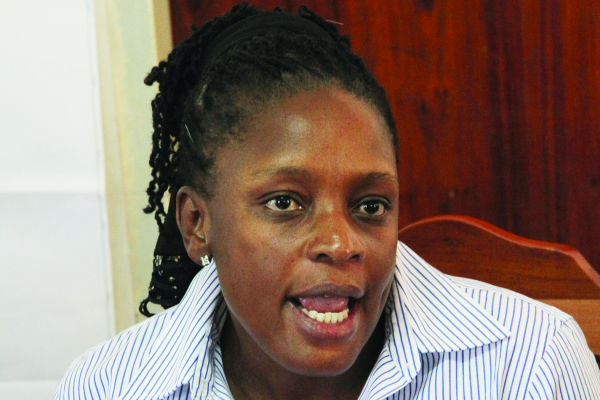
Priscilla Misihairabwi-Mushonga, the MDC legislator from Matabeleland South, found her way into Parliament through the Proportional Representation (PR) quota system, which reserves 60 seats for women in the National Assembly.
BY NIZBERT MOYO
Misihairabwi-Mushonga is undoubtedly one of the most vibrant MPs in the National Assembly, mainly because of her lively contributions. She has introduced several motions, especially advocating for free sanitary wear for women and girls, and has used controversial graphic images to illustrate her points, including bringing tampons and a menstrual cup into Parliament.
Although some people have described her actions as stunts, her approach has managed to influence policy, as well as to push Finance minister Patrick Chinamasa to assist local manufacturers of sanitary wear with foreign currency.
The following are excerpts of an interview between Southern Eye correspondent Nizbert Moyo (SE) and Priscilla Misihairabwi-Mushonga (PMM).
SE: Who is Priscilla Misihairabwi-Mushonga and why did you join politics?
PMM: I am a family woman and am passionate about issues to do with women. I joined politics in the mid-90s after being inspired by former Zimbabwe Unity Movement leader Margaret Dongo. I could not stomach anymore the abuse that I saw being meted on women, particularly to people like Dongo. I have a passion for issues to do with women and marginalised people, such as people from Matabeleland South. Their Ndebele language was not even spoken in Parliament and this pained me a lot. I am born of a Ndebele mother, and I have always been fighting hard to make sure that Ndebele is also recognised in Parliament, and now it is being used just like other languages in Parliament.
SE: What have you offered to the province as PR MP?
- Chamisa under fire over US$120K donation
- Mavhunga puts DeMbare into Chibuku quarterfinals
- Pension funds bet on Cabora Bassa oilfields
- Councils defy govt fire tender directive
Keep Reading
PMM: I have advocated for the formulation of policies to do with women and the people of Matabeleland. I have raised tender issues pertaining to who controls resources and where do they go to, for example, the issue of debt collectors who come from Harare to attach people’s properties in Bulawayo, the issue of procurement of ambulances by Bulawayo City Council which was awarded to a Harare company and others. I have raised the issue of human trafficking, and I was part of the people that facilitated the bringing back of the women that were trafficked to other countries. There is also domestic trafficking, where women are trafficked from rural areas and put in the streets and abused. I have raised issues of mandatory sentencing of sexual offenders for all forms of gender-based violence, as well as issues on financial inclusion of women and youths. I am passionate about and have raised issues of girl child abuse, sanitary wear and second-hand clothes and underwear, which are a health hazard. I sit in the Public Accounts, Foreign Affairs and Justice Parliamentary Portfolio committees, and I am the chairperson of the Women and Youth Portfolio Committee.
SE: What can you say of the five years that you have been in Parliament?
PMM: To be honest, this has been one of my most enjoyable years in Parliament, and I am very happy. I have the freedom to speak on any issue that I need and there has been a lot of jostling in Parliament. In other years there was too much work for me as an MP. When I resigned from the MDC secretary-general position, I then had the freedom to speak on many issues and was able to focus on Matabeleland South province and issues to do with women, which is my passion. I do not want to hold any position in the party. I am also not considering running a constituency because I have done that before. I want to leave that to those with fresher minds. If I run I would be comfortable with running in the same position that I was all along as a PR legislator. It is the people and the party who should decide whether to choose me to represent them or not. Proportional representation is about people.
SE: What can you tell aspiring women politicians?
PMM: One has to become a brand and it takes time to become a brand. It means doing things that you are passionate about. Most of the people know that if they want to know about issues to do with women, development and marginalisation, they have to talk to Priscilla because that is my passion. I always rely on God because friends cannot be relied on in politics.











